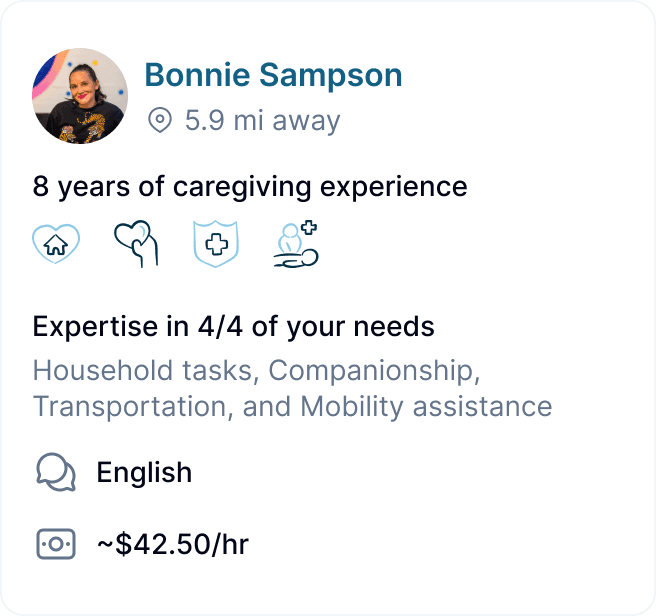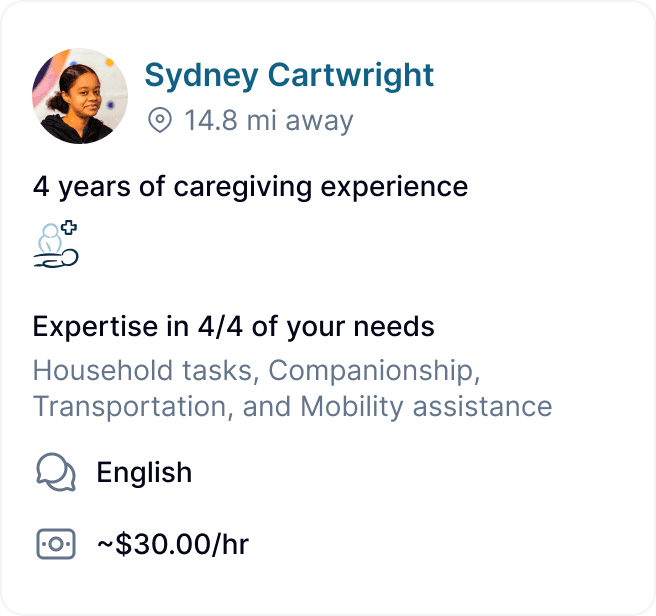How do I find help for my elderly parent?
Feb 4, 2025
Feb 4, 2025



Caring for an elderly parent can be both rewarding and challenging. As your parent ages, they may require more support with daily tasks, health care, and emotional well-being. Knowing where to find the right help is crucial for ensuring their quality of life and your own well-being as a caregiver.
Here’s a step-by-step guide to help you navigate this journey.
1. Identify the Need for Help
The first step is recognizing when your parent needs assistance. Signs may include difficulty with daily tasks, changes in physical or mental health, or increased isolation. If you notice these signs, it's essential to have an open conversation with your parent about your concerns.
2. Assess Their Needs
Determine what kind of help your parent needs. This could range from non-medical assistance like housekeeping or meal preparation to medical care for chronic conditions. Understanding their needs will guide your search for appropriate services.
3. Explore Local Resources
Local resources can provide valuable support:
Eldercare Locator: This service offers information on support services, elder rights, insurance, health resources, and transportation options.
Area Agencies on Aging (AAAs): These agencies provide resources on financial assistance, respite care, and in-home services.
Community Centers: Many offer programs for seniors, such as exercise classes, social events, Adult Day Care and educational workshops.
4. Consider In-Home Care Options
In-home care allows your parent to stay in their familiar environment while receiving necessary support:
Non-Medical Home Care: Assistance with daily tasks like bathing, dressing, and meal preparation.
Home Health Care: Medical care provided by professionals, such as nurses or physical therapists/
Although aging in place is preferred by most seniors, it's important to select the best option for their wellbeing. You can read more about picking the best senior living option for your parent here.
5. Financial Planning
Understand the costs involved and explore financial options:
Medicare and Medicaid: These programs may cover some in-home care costs, depending on eligibility.
Long-Term Care Insurance: Consider investing in insurance that covers long-term care expenses.
Veterans Benefits: If your parent is a veteran, they may be eligible for additional benefits.
6. Support for Caregivers
Don’t forget to take care of yourself:
Respite Care: Temporary relief from caregiving duties to rest and recharge.
Support Groups: Join groups for emotional support and advice from other caregivers.
Professional Guidance: Consult with geriatric care managers or elder law attorneys for expert advice.
7. Technology and Tools
Utilize technology to enhance caregiving:
Caregiving Apps: Tools like Lotsa Helping Hands can help coordinate care tasks among family and friends.
Home Safety Devices: Install safety features like fall detectors or medication reminders.
Conclusion
Finding the right help for your elderly parent requires patience, research, and support. By understanding their needs, exploring local resources, and considering in-home care options, you can ensure they receive the best possible care.
Clara offers a streamlined way to find and manage caregivers, making it easier to balance your caregiving responsibilities with other aspects of your life. If you need assistance in finding the right caregiver or managing care services, Clara is here to help.
Contact us today to learn more about how we can support you and your loved one.
Caring for an elderly parent can be both rewarding and challenging. As your parent ages, they may require more support with daily tasks, health care, and emotional well-being. Knowing where to find the right help is crucial for ensuring their quality of life and your own well-being as a caregiver.
Here’s a step-by-step guide to help you navigate this journey.
1. Identify the Need for Help
The first step is recognizing when your parent needs assistance. Signs may include difficulty with daily tasks, changes in physical or mental health, or increased isolation. If you notice these signs, it's essential to have an open conversation with your parent about your concerns.
2. Assess Their Needs
Determine what kind of help your parent needs. This could range from non-medical assistance like housekeeping or meal preparation to medical care for chronic conditions. Understanding their needs will guide your search for appropriate services.
3. Explore Local Resources
Local resources can provide valuable support:
Eldercare Locator: This service offers information on support services, elder rights, insurance, health resources, and transportation options.
Area Agencies on Aging (AAAs): These agencies provide resources on financial assistance, respite care, and in-home services.
Community Centers: Many offer programs for seniors, such as exercise classes, social events, Adult Day Care and educational workshops.
4. Consider In-Home Care Options
In-home care allows your parent to stay in their familiar environment while receiving necessary support:
Non-Medical Home Care: Assistance with daily tasks like bathing, dressing, and meal preparation.
Home Health Care: Medical care provided by professionals, such as nurses or physical therapists/
Although aging in place is preferred by most seniors, it's important to select the best option for their wellbeing. You can read more about picking the best senior living option for your parent here.
5. Financial Planning
Understand the costs involved and explore financial options:
Medicare and Medicaid: These programs may cover some in-home care costs, depending on eligibility.
Long-Term Care Insurance: Consider investing in insurance that covers long-term care expenses.
Veterans Benefits: If your parent is a veteran, they may be eligible for additional benefits.
6. Support for Caregivers
Don’t forget to take care of yourself:
Respite Care: Temporary relief from caregiving duties to rest and recharge.
Support Groups: Join groups for emotional support and advice from other caregivers.
Professional Guidance: Consult with geriatric care managers or elder law attorneys for expert advice.
7. Technology and Tools
Utilize technology to enhance caregiving:
Caregiving Apps: Tools like Lotsa Helping Hands can help coordinate care tasks among family and friends.
Home Safety Devices: Install safety features like fall detectors or medication reminders.
Conclusion
Finding the right help for your elderly parent requires patience, research, and support. By understanding their needs, exploring local resources, and considering in-home care options, you can ensure they receive the best possible care.
Clara offers a streamlined way to find and manage caregivers, making it easier to balance your caregiving responsibilities with other aspects of your life. If you need assistance in finding the right caregiver or managing care services, Clara is here to help.
Contact us today to learn more about how we can support you and your loved one.
Caring for an elderly parent can be both rewarding and challenging. As your parent ages, they may require more support with daily tasks, health care, and emotional well-being. Knowing where to find the right help is crucial for ensuring their quality of life and your own well-being as a caregiver.
Here’s a step-by-step guide to help you navigate this journey.
1. Identify the Need for Help
The first step is recognizing when your parent needs assistance. Signs may include difficulty with daily tasks, changes in physical or mental health, or increased isolation. If you notice these signs, it's essential to have an open conversation with your parent about your concerns.
2. Assess Their Needs
Determine what kind of help your parent needs. This could range from non-medical assistance like housekeeping or meal preparation to medical care for chronic conditions. Understanding their needs will guide your search for appropriate services.
3. Explore Local Resources
Local resources can provide valuable support:
Eldercare Locator: This service offers information on support services, elder rights, insurance, health resources, and transportation options.
Area Agencies on Aging (AAAs): These agencies provide resources on financial assistance, respite care, and in-home services.
Community Centers: Many offer programs for seniors, such as exercise classes, social events, Adult Day Care and educational workshops.
4. Consider In-Home Care Options
In-home care allows your parent to stay in their familiar environment while receiving necessary support:
Non-Medical Home Care: Assistance with daily tasks like bathing, dressing, and meal preparation.
Home Health Care: Medical care provided by professionals, such as nurses or physical therapists/
Although aging in place is preferred by most seniors, it's important to select the best option for their wellbeing. You can read more about picking the best senior living option for your parent here.
5. Financial Planning
Understand the costs involved and explore financial options:
Medicare and Medicaid: These programs may cover some in-home care costs, depending on eligibility.
Long-Term Care Insurance: Consider investing in insurance that covers long-term care expenses.
Veterans Benefits: If your parent is a veteran, they may be eligible for additional benefits.
6. Support for Caregivers
Don’t forget to take care of yourself:
Respite Care: Temporary relief from caregiving duties to rest and recharge.
Support Groups: Join groups for emotional support and advice from other caregivers.
Professional Guidance: Consult with geriatric care managers or elder law attorneys for expert advice.
7. Technology and Tools
Utilize technology to enhance caregiving:
Caregiving Apps: Tools like Lotsa Helping Hands can help coordinate care tasks among family and friends.
Home Safety Devices: Install safety features like fall detectors or medication reminders.
Conclusion
Finding the right help for your elderly parent requires patience, research, and support. By understanding their needs, exploring local resources, and considering in-home care options, you can ensure they receive the best possible care.
Clara offers a streamlined way to find and manage caregivers, making it easier to balance your caregiving responsibilities with other aspects of your life. If you need assistance in finding the right caregiver or managing care services, Clara is here to help.
Contact us today to learn more about how we can support you and your loved one.
More about finding care
More about finding care


How Do I Find A Reliable Private Caregiver?



Vanessa Bustos


Navigating the Choices: Private In-Home Caregivers vs. Agency Care



Lowrie Hilladakis


Can a Dementia Patient Be Cared for at Home?



Lowrie Hilladakis


The Senior Care Crisis: Strengthening the Caregiving Workfoce



Lowrie Hilladakis


What if my caregiver isn't the right fit?



Jon Levinson


What Are the Differences Between a Personal Care Assistant and a Certified Caregiver?



Vanessa Bustos


How Do I Pick the Best Senior Living Option for My Parents?



Vanessa Bustos


4 Signs It Might Be Time To Hire Care For Your Senior Loved One



Vanessa Bustos


Navigating Post-Hospital Care: A Guide



Lowrie Hilladakis


How Can I Ensure the Quality of Home Health Care Services for My Loved One?



Lowrie Hilladakis
GEt started for free
Better care starts with Clara.
Find, hire, and pay top-notch caregivers without the headache for a price that fits your budget.



GEt started for free
Better care starts with Clara.
Find, hire, and pay top-notch caregivers without the headache for a price that fits your budget.



GEt started for free
Better care starts with Clara.
Find, hire, and pay top-notch caregivers without the headache for a price that fits your budget.

